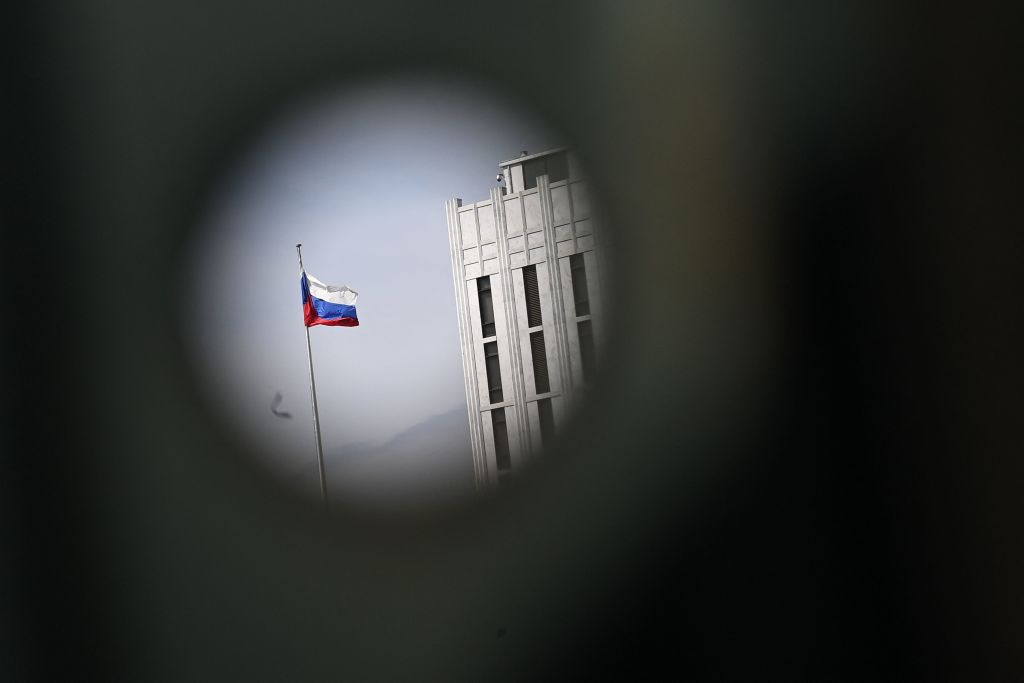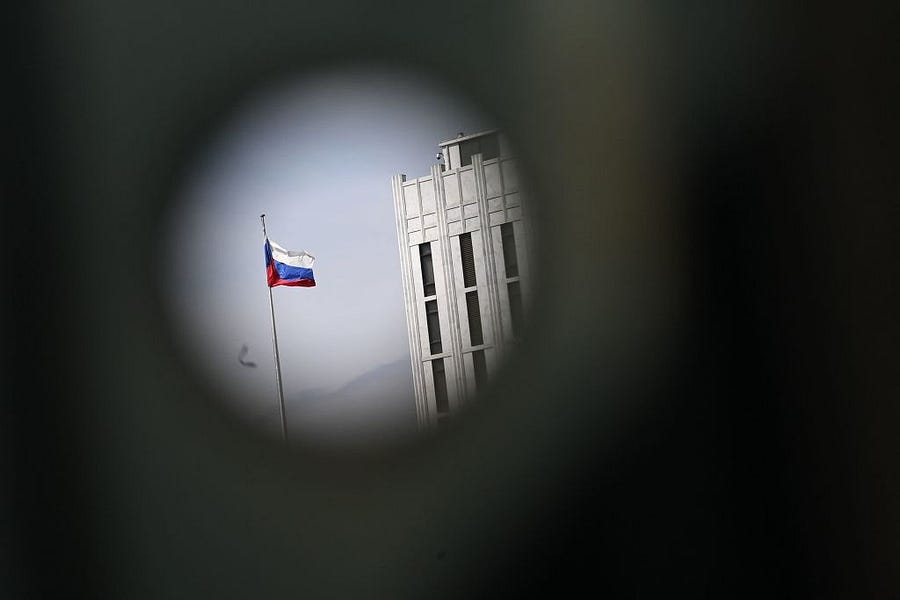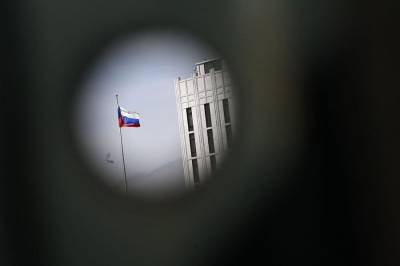Happy Monday! Five days into Russia’s assault, Ukraine is still holding strong, and the world’s position against the Kremlin is hardening. Let’s get to the news.
Quick Hits: Today’s Top Stories
President Vladimir Putin ordered Russian nuclear forces on high alert on Sunday in response to a weekend of what he deemed “aggressive” NATO statements and hard-hitting economic sanctions. Intense fighting and shelling continued in cities across Ukraine, with Russians making some gains in the South while Ukrainian defense forces persisted in “frustrating” Russian efforts in Kyiv, Kharkiv, and Chernihiv. As we hit send on this newsletter, Ukrainian and Russian officials were beginning to meet for peace talks near the Pripyat River on the border of Belarus and Ukraine. According to U.S. and British defense officials, Russian forces have yet to take control of a major city despite committing about two-thirds of their amassed troops and firing over 300 missiles.
A lot more weaponry is headed to Kyiv, with President Joe Biden approving on Friday the release of up to $350 million worth of military aid to Ukraine. Germany followed suit on Saturday, reversing a decades-old policy of not sending weapons into war zones by issuing 1,000 anti-tank weapons and 500 Stinger anti-aircraft defense systems to Ukraine, as well as authorizing the Netherlands and Estonia to send German-controlled RPGs and howitzers. On Sunday, the European Union agreed to provide Ukraine with approximately €500 million worth of arms.
President Biden announced on Friday his intent to nominate Judge Ketanji Brown Jackson, currently a judge on the U.S. Court of Appeals for the D.C. Circuit, to fill the Supreme Court vacancy left by Justice Stephen Breyer’s impending retirement.
In the wake of most states and localities loosening their own COVID-19 restrictions, the Centers for Disease Control on Friday updated the benchmarks it uses to determine its guidance on masking and other pandemic interventions. The new framework—which the CDC says applies to schools, but not yet public transportation—incorporates a community’s hospital capacity in addition to its case counts, and currently recommends masking for only about 30 percent of the country.
Two days after the CDC guidance was released, New York Gov. Kathy Hochul announced the state would do away with its school mask mandate, beginning Wednesday, March 2.
The Federal Reserve’s preferred measure of inflation, the personal consumption expenditures (PCE) price index, increased 6.1 percent year-over-year in January, the Bureau of Economic Analysis reported Friday. The measure was up from 5.8 percent in December, and at its highest level since 1982.
The U.S. Embassy in Moscow on Sunday urged U.S. citizens in Russia to consider departing “immediately” because an increasing number of airlines are canceling flights into and out of the country.
The South Korean military reported Sunday that North Korea launched another ballistic missile off its east coast on Sunday, its eighth such test this year. North Korean state media claimed the launch was related to its development of a reconnaissance satellite.
Johnson & Johnson, AmerisourceBergen, Cardinal Health, and McKesson have agreed to pay U.S. states a total of roughly $25 billion over the next two decades or so to settle thousands of lawsuits over the companies’ role in the opioid epidemic.
Republican Sen. Jim Inhofe of Oklahoma, 87, announced on Friday he will retire from the Senate at the end of this year, despite being reelected for a six-year term in 2020. He endorsed his chief of staff, Luke Holland, in what will likely be a crowded GOP primary.
The West Gets Serious About Russia Sanctions

Turns out the West just needed a little kick in the pants.
After months (and really, years) of failing to treat the threat emanating from Russia with the seriousness it deserved, the democratic world—simultaneously horrified and inspired by the images coming out of Ukraine—flipped a switch over the weekend, ratcheting up pressure on Moscow in ways previously considered unimaginable.
According to reporting from The Washington Post, European Union leaders were set to continue with their more gradual escalation of sanctions on Russia until Ukrainian President Volodymyr Zelensky dialed into their meeting with an emotional plea from the battlefield in Kyiv, admitting it might be the last time they spoke with him alive. The change of heart among the remaining holdouts—Germany, Austria, Italy, Cyprus—was so intense and so immediate, per the same report, that the White House had to “scramble” over the weekend to keep pace with its European counterparts in crafting additional sanctions.
A lot has happened since we were last in your inbox:
The European Union voted to ratify sanctions on Russian President Vladimir Putin, Russian Foreign Affairs Minister Sergey Lavrov, members of Russia’s National Security Council and State Duma who supported Putin’s endeavors in Ukraine, and Belarusian officials who “facilitated” Russian military aggression. The sanctions package also blocked Russian banks and state-owned entities from European markets, targeted Russian oligarchs, and implemented export controls covering the aviation, space, oil refining, defense, and security sectors.
The United States implemented direct sanctions on Putin, Lavrov, Defense Minister Sergei Shoigu, Armed Forces Chief Valery Gerasimov, and about a dozen other members of Russia’s Security Council.
Europe, Canada, Japan, and the U.S. announced a joint commitment to remove “select” Russian banks from the SWIFT global financial messaging system, impose “restrictive measures” on Russia’s Central Bank, make it more difficult for wealthy Russian individuals to buy citizenship in other countries, and launch a “transatlantic task force” aimed at identifying oligarch assets and ensuring sanctions are implemented. France seized a cargo ship in the English Channel on Saturday that the United States believes is owned by a subsidiary of a sanctioned Russian bank.
The United Kingdom updated its list of Russian sanctions, which is now 38-pages long and targets 190 individuals and 59 entities. “Oligarchs in London have nowhere to hide,” Prime Minister Boris Johnson said.
The world’s largest semiconductor manufacturers—including Taiwan Semiconductor Manufacturing Company, GlobalFoundries, and Intel—announced they have begun halting sales to Russia in response to the export control sanctions the Biden administration implemented last week.
The European Union agreed to shut down its airspace to Russian-owned and Russian-registered aircraft, ban the state-owned outlets Russia Today and Sputnik, and extend some of its existing export controls on Russia to Belarus. Canada announced the closure of its airspace to Russian planes, as well.
Delta Airlines ended its relationship with Russian carrier Aeroflot, BP divested its 20 percent stake in the Russian state-owned oil company Rosneft, FedEx and UPS have temporarily suspended shipments into Russia, the European Broadcasting Union booted Russia from the Eurovision Song Contest, Formula 1 canceled this year’s Russian Grand Prix, UEFA decided to relocate this year’s Champions League final from St. Petersburg to Paris, and the International Olympic Committee urged all international sports bodies to relocate or cancel events scheduled to be held in Russia or Belarus.
Meta and Google announced they will prohibit Russian state media from advertising or monetizing on their respective platforms anywhere in the world, and Twitter said it is “temporarily pausing” all advertisements in Ukraine and Russia to “ensure critical public safety information is elevated and ads don’t detract from it.”
These moves—in combination with the measures announced last week—are in the process of crippling the Russian economy. As of about 11 a.m. in Moscow today, the ruble had plunged 33 percent against the dollar since Friday alone, and 49 percent since the beginning of the year. In a frantic effort to stabilize markets, Russia’s central bank more than doubled its main interest rate to 20 percent and, in a move some analysts joked was more damaging to the Russian economy than any Western sanctions, ordered stockbrokers to block foreigners’ from selling Russian securities. Moscow’s Stock Exchange was suspended until at least 3 p.m. local time, and Ukrainians are no longer the only ones standing in long lines to withdraw cash from ATMs.
Despite state TV’s efforts to blame the West, the teetering economic situation is likely to bolster internal resistance to Putin’s war, which remains visible in the streets of Moscow and St. Petersburg but has also begun to reach the country’s elite. Russian tennis star Andrei Rublev wrote “no war please” on the lens of a cameraman filming his match, and Mikhail Matyevev, a Communist Party member of the State Duma, called for an “immediate” end to the conflict before deleting his tweet. The daughter of Putin’s personal spokesman posted a “no to war” message online, and Vyacheslav Markhayev, another member of the State Duma, essentially accused Putin of lying to the body about his true aims in Ukraine. Finally starting to be subject to sanctions, even some of the country’s billionaires are inching out with slight public criticisms—and much harsher private ones.
We’ll have more on the latest military developments in tomorrow’s TMD, but this weekend’s economic developments certainly packed a punch. Just before we hit send on this newsletter, the Kremlin announced Putin will convene an emergency meeting with his cabinet and central bank later today after the West’s “heavy” and “problematic” sanctions “significantly changed Russia’s economic reality.”
It’s KBJ
Domestic politics have rightfully been pushed to the backburner these past few days, but there are still other things going on.
In remarks that began just after 2 p.m. ET on Friday—less than 30 hours after Russian President Vladimir Putin announced his “special military operation”—President Joe Biden fulfilled two promises, announcing a black woman as his nominee to replace Justice Stephen Breyer on the Supreme Court before the calendar turned to March. After 29 days of deliberating and interviewing candidates, he settled on Judge Ketanji Brown Jackson, the frontrunner all along.
“During this process, I looked for someone who, like Justice Breyer, has a pragmatic understanding that the law must work for the American people,” Biden said. “Someone with extraordinary character, who will bring to the Supreme Court an independent mind, uncompromising integrity, and with a strong moral compass and the courage to stand up for what she thinks is right.”
Writing about Breyer’s retirement last month, we highlighted Jackson—alongside California Supreme Court Justice Leondra Kruger and South Carolina U.S. District Judge J. Michelle Childs—as one of three candidates Biden was likely to choose. In the end, the judge on the U.S. Court of Appeals for the D.C. Circuit—who clerked for Breyer two decades ago—won out.
“[Justice Breyer] not only gave me the greatest job that any young lawyer could ever hope to have,” Jackson said in a brief acceptance speech. “He also exemplified every day in every way that a Supreme Court Justice can perform at the highest level of skill and integrity while also being guided by civility, grace, pragmatism, and generosity of spirit.”
Perhaps anticipating Republicans’ imminent concerns, Jackson did not mention her experience as a federal public defender or time serving on the bipartisan U.S. Sentencing Commission. Instead, she emphasized her family’s extensive ties to law enforcement: Her brother was a cop and detective in Baltimore before he enlisted in the Army and served two tours of duty in the Middle East, and two of her uncles were police officers—with one rising the ranks to become the police chief of Miami, where Jackson grew up.
Since Republicans eliminated the filibuster for Supreme Court nominees in 2017, Jackson doesn’t need any GOP votes to be confirmed—but she’ll likely get a couple anyway. Unlike previous pushes on electoral reform and Build Back Better, Biden has made a point in recent weeks to consult with a handful of moderate Republicans on his selection, and he landed on a nominee who was confirmed to her current position on a bipartisan basis less than a year ago. One of those Republican “Yea” votes, Sen. Susan Collins, described Jackson on Friday as an “experienced federal judge with impressive academic and legal credentials.”
Sen. Lindsey Graham, another previous “yes” on Jackson, was less enthused, as Childs—his fellow South Carolinian—was passed over. “The Harvard-Yale train to the Supreme Court continues to run unabated,” he said, referencing the two law schools where eight of the nine current Supreme Court justices—plus Jackson—went. “The radical Left has won President Biden over yet again.”
Childs, who went to University of South Carolina School of Law, was also the top choice of Rep. Jim Clyburn, the South Carolina Democrat whose endorsement of Biden two years ago hinged upon Biden making his pledge to nominate a black woman to the Supreme Court. But he didn’t seem as spurned as Graham. “[Jackson] is outstanding, she will make a great member of the Supreme Court,” he said Friday, adding he did not see her “as being radical at all.”
Progressive groups had lined up behind Jackson in recent weeks due to her previous stops in public defense and sentencing reform, and were particularly hostile to Childs for her work at a private firm representing employers after graduating law school. But there’s no reason to believe their jurisprudence on the Supreme Court would have differed much, and Jackson had some unconventional backers as well.
Francis Suarez, the Republican mayor of Miami, congratulated Jackson on her “historic nomination” on Friday, and former GOP House Speaker Paul Ryan—a distant relative of Jackson’s by marriage—praised her intellect, character, and integrity. After Biden announced Jackson as his pick, Fraternal Order of Police National President Patrick Yoes detailed the FOP’s previous engagement with her on the U.S. Sentencing Commission and said the group is “reassured that, should she be confirmed, she would approach her future cases with an open mind and treat issues related to law enforcement fairly and justly.”
(From Ryan’s former spokesman: “KBJ is Paul’s wife’s sister’s husband’s brother’s wife.”)
Democratic leaders in the Senate—temporarily short one vote while Sen. Ben Ray Luján of New Mexico recovers from a stroke—have expressed interest in an “expeditious” confirmation process that wraps up before the chamber’s Easter break begins on April 9. And although most Republicans will oppose Jackson—over her rulings regularly being overturned by the D.C. Circuit, her membership on Harvard University’s Board of Overseers as the Supreme Court is set to hear a case on Harvard’s admissions policy, or her general judicial philosophy—the GOP does not appear to be itching for a drawn out fight over a nominee that will not change the existing ideological composition of the Court.
“The Senate must conduct a rigorous, exhaustive review of Judge Jackson’s nomination as befits a lifetime appointment to our highest Court,” Senate Minority Leader Mitch McConnell said Friday. “This is especially crucial as American families face major crises that connect directly to our legal system, such as skyrocketing violent crime and open borders.”
Worth Your Time
In her latest for Reason, Elizabeth Nolan Brown pleads with Americans to stop making Russia’s invasion of Ukraine about our own domestic grievances. “I promise, the culture war and all its brave keyboard warriors will still be there next week. So will COVID-19, and climate change, and border battles. Just let it go for a minute. Show some respect, empathy, and perspective,” she writes. “If you’re tempted to post things like: Russia is doing this because Americans use too many pronouns! At least Putin isn’t woke! How will the murder of Ukrainian civilians affect gas prices? Stop. Go outside for a walk. Call a loved one. Cuddle a pet. Do anything real and good and tangible while counting your blessings that you will very likely never know the fear and pain of having your country invaded by a warmongering dictator. This isn’t about us. Stop making it about us.”
In National Review, Sam Kay argues the killing of Amir Locke in a no-knock raid earlier this month reinforces the need for a multiracial gun-rights coalition. “Locke, a lawful gun owner and permit holder, had no criminal record. His work as a DoorDash delivery driver took him throughout Minneapolis, where recent carjackings made him feel unsafe, and a gun provided comfort and protection in a dangerous city,” Kay writes. “Historically, gun control was often used to dominate and disarm minorities. After the Civil War, there were numerous laws passed throughout the rural South prohibiting black Americans from owning firearms. … Advocates for gun rights should make a special effort to ensure that minority gun rights are protected. It would help right those past wrongs and protect the Second Amendment. Gun-rights advocates should also work, through this durable political coalition, to combat policies that infringe upon these rights.”
Presented Without Comment
Also Presented Without Comment
Also Also Presented Without Comment
Toeing the Company Line
The Dispatch is hiring again! If you have experience managing digital campaigns, you might be a good fit for our Social Media Marketing Manager position.
It was a jam-packed Dispatch Podcast on Friday, with Sarah, Steve, Jonah, and David jumping from KBJ’s SCOTUS nomination, to the latest out of Ukraine, to a preview of Tuesday’s State of the Union.
Haley’s latest Uphill (🔒) focuses on what else Congress can do to sanction Russia in response to Putin’s invasion.
In his Friday G-File, Jonah draws on G.K. Chesterton to remind readers the (relatively) peaceful world order of the past 80 years is a historical aberration. “For eight decades, the West kept the historical norm of wars of territorial aggression and irredentism partially at bay,” he writes. “History is always waiting for an opportunity to invade that ‘zone of peace.’ Because history, like nature, abhors a vacuum.”
Sunday’s French Press focuses on the bravery of Ukrainian President Volodymyr Zelensky, arguing he is a man who’s risen to the moment. “It’s one thing to say, ‘I will lead you,’” David notes. “It’s another thing entirely to say, ‘I am with you,’ and to demonstrate it by laying your own life on the line.”
The website was popping over the weekend! From CPAC, Andrew had pieces on Marjorie Taylor Greene’s weekend dalliance with a white nationalist group and Donald Trump’s primetime address. Andrew Fink wrote about Putin’s renewed propaganda push, and Klon Kitchen shared his thoughts on what the United States should do next. Patrick Frey spoke to Bill Browder about sanctions against Russia, and Mike Watson argued Putin’s invasion has revealed his biggest fears.
Let Us Know
The Biden administration has pledged not to target Russia’s oil industry with sanctions, arguing such a move would harm American consumers more than Putin’s regime. The existing measures seem to be inflicting plenty of pain, but would you be in favor of paying even higher gas prices in the short- to medium-term if it meant further cutting off Russia from the world?
Reporting by Declan Garvey (@declanpgarvey), Charlotte Lawson (@lawsonreports), and Steve Hayes (@stephenfhayes).







Please note that we at The Dispatch hold ourselves, our work, and our commenters to a higher standard than other places on the internet. We welcome comments that foster genuine debate or discussion—including comments critical of us or our work—but responses that include ad hominem attacks on fellow Dispatch members or are intended to stoke fear and anger may be moderated.
With your membership, you only have the ability to comment on The Morning Dispatch articles. Consider upgrading to join the conversation everywhere.